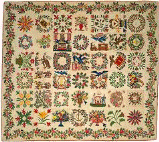Textile Society of America

Textile Society of America: Symposium Proceedings
Date of this Version
1992
Document Type
Article
Citation
From Textiles in Daily Life: Proceedings of the Third Biennial Symposium of the Textile Society of America, September 24–26, 1992 (Earleville, MD: Textile Society of America, Inc., 1993).
Abstract
Richard Vaux was a Philadelphia merchant who sold textiles during and immediately after the Revolution. His story may be told as the biography of a Quaker merchant and businessman. But his story has more to offer. It may, more importantly, shed light on the merchant profession itself, for it is possible to show how this man's personal life influenced the goods he distributed to the American market .
The Revolutionary period, when Vaux reached the peak of his business activity, has traditionally been considered a "transitional" period, and has not been the focus of much recent material culture scholarship.2 This period, between 1777 and 1790, had unusual constraints and characteristics that need to be isolated, particularly for how they affected businessmen like Richard Vaux.
The war interrupted normal trade patterns . Many merchants were put out of business, while for others this period worked greatly to their advantage. Laws against the importation of some goods made demands on how a merchant could select and distribute his goods, and had implications for their use. Privateers and warships made travel more dangerous, although not impossible. Adventurous businessmen benefited from working the new circumstances to their advantage, and everyone had to adapt in order to continue trading during this time of upheaval.
The business and life-events of Richard Vaux shed light on the changes that took place during this period, and how one person adapted to them. They lead to a greater understanding of individual merchant decisions and ultimately to the factors behind the distribution of goods, in this case textiles, in America from 1777 to 1790.


Comments
Copyright © 1992 by the author(s).